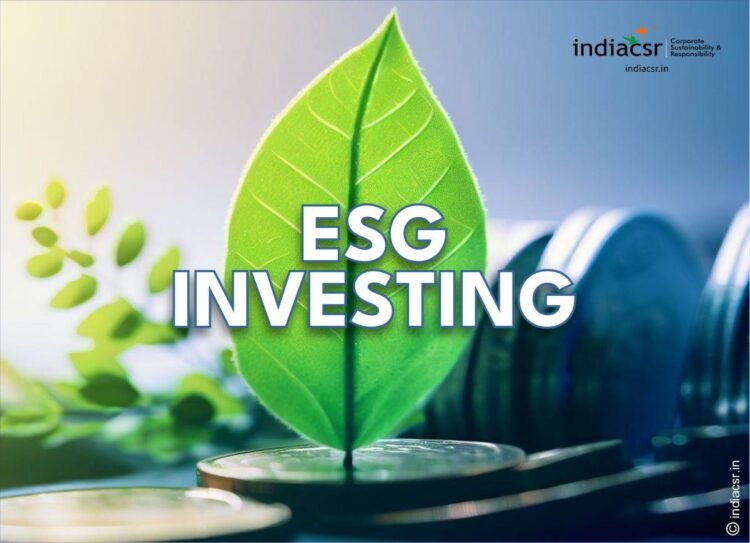ESG Investing is a potent driver that propels sustainable business practices, leading to the realization of long-term growth and a profound impact on society and the environment.

In the realm of contemporary business practices, the importance of ESG – Environmental, Social, and Governance investing is becoming increasingly prominent. This article serves as an insightful discussion into the essence of ESG investing, elucidating why business leaders should prioritize the integration of sustainability into their business accounts.
Introduction: The Rise of ESG Investing
Over the recent years, ESG, which is an acronym for Environment, Social, and Governance started gaining paramount significance in boardrooms for the right reasons. Statistics show that a company that invests the right amount of its time, and resources into ESG, gains multiple benefits in the long run and makes a colossal impact on its business in the macro scenario but it’s not void of challenges, of course. In a nutshell, let’s try to decode why the leadership of organizations should integrate sustainability with their business goals.
Overcoming ESG Implementation Challenges
In yesteryears, the primary challenge around ESG was that the companies did not know how to achieve the goal. Additionally, it lacked regulations or any framework or guidelines that a company could follow to achieve the goal. Today, many organizations have a dedicated vertical for ESG as its impact is widening across various areas. It is not limited to just people, the planet, and profits but it now has started impacting data use, its protection, supply chain, machine learning, and artificial intelligence to name a few.
Benefits of ESG Strategy Implementation
Implementing an ESG strategy could include using renewable energy, working on energy resource efficiency measures, transitioning towards a circular economy which leads to sustainability, and enhancing reliance on the local supply chain. Altogether it leads to more benefits as one can increase the profit margin through tax gains and infrastructure.

ESG Investment: A Strategy for Future
Making informed decisions in these areas also helps the organisations in the short and long term. For instance, during COVID there was a survey done by a consulting firm that showed while businesses and investors are usually keen about financial benefits, if designed as a future investment, one can see the disruption in just about three quarters which garnered quite a bit of interest from investors.
ESG Strategies and Talent Acquisition
The other benefit that ESG strategy has is that it helps organisations to attract good talent. The younger generations, especially the millennials and GenZ are quite cautious about whom they choose to work with and what the brand represents. In this age where hiring has become one of the biggest challenges for even corporations, creating a brand that stands with the right cause and takes actionable steps, can build a strong positive image about the company which will also snowball into attracting the right talent and investors.
The Relation Between ESG Scores and Talent Attraction
According to a study conducted by MarshMcLennan, companies that were rated as “top employers” in terms of employee satisfaction and attractiveness to talent have significantly higher ESG scores compared to their peers. Additionally, the study shows that millennial and Gen Z employees will comprise 72% of the global workforce who are deeply concerned about social advocacy and place a strong focus on ESG issues in both their personal and professional lives.
ESG Investment in India: An Emerging Trend
According to a study Standard Chartered’s Sustainable Banking Report 2022: Mobilising retail investor capital, across India, 46 percent of investors want to help restore the environment, while nearly 40 percent of investors want to put their money to hedge against ESG risks, and 33 percent want to make a positive social impact. A better-regulated ESG market, coupled with a growing pool of retail investors, could even see India’s $1 trillion of potential retail capital directed toward addressing ESG issues.
Challenges of ESG Implementation
However, while the organisations understand the growing significance of it, the implementation of it is many times quite challenging. Cost of implementing an ESG strategy could feel like a financial burden for companies in the initial stages. But, in the long run, these costs come down and help to build more efficiencies within the company.
Government Incentives and ESG Strategies
Additionally, the incentives that the Government is providing along with the company’s focus on local procurement, sustainability, and green energy lead to long-term opportunities. Some of the initiatives include achieving 450 GW of renewable energy capacity by 2030. To achieve this target, the government has launched various initiatives, such as the Kisan Urja Suraksha evam Utthaan Mahabhiyan (KUSUM) scheme, aimed at promoting solar power in agriculture. It has launched the National Clean Air Programme (NCAP) to address air pollution in India. The NCAP aims to reduce particulate matter (PM) pollution by 20-30% in 102 cities by 2024.
Opportunities in ESG Strategy Implementation
An ESG strategy in a company also leads it to finding newer opportunities in these areas which eventually leads to the expansion of products or service lines. During the implementation of an ESG strategy, a company needs to track several key performance indicators (KPIs) to see results. For instance, conducting commercial, and operational diligence, monitoring data, and compliance are some of the common KPIs among companies.
The Future of ESG in Various Industries
The next phase for some sectors like technology and energy have already picked up pace, it will be interesting to see how the other sectors implement ESG strategies in their domains before it’s too late. Over the next few years, ESG strategies will inevitably be taking over the centre stage in boardrooms.
The Transition to a Low-Carbon Economy
At this juncture, many companies are transitioning to a low-carbon economy and this area is garnering a lot of attention from investors across the globe. Secondly, there is an enhanced focus on actionable strategy which was missing in earlier years. With better understanding of the issues now, the companies are expected to address the issues. This area will also eventually include vast areas of issues like diversity, closer corporate governance, compliance, data security, and cyber security.
SEBI on ESG Disclosures, Ratings and Investing
The Securities and Exchange Board of India (SEBI) is the regulatory body for the securities market in India. In February 2023, SEBI released a consultation paper on ESG Disclosures, Ratings and Investing. The paper seeks public comments on the regulatory framework of ESG Disclosures by listed entities, ESG Ratings in the securities market and ESG Investing by Mutual Funds.
ESG investing is an investment approach that considers environmental, social and governance factors when making investment decisions. ESG investors believe that companies that are committed to sustainability and good governance are better long-term investments. The rise of ESG investing has led to a growing demand for ESG disclosures from listed companies. ESG disclosures provide investors with information about a company’s environmental, social and governance performance. This information can help investors to make informed investment decisions.
SEBI’s consultation paper seeks to develop a regulatory framework for ESG disclosures that will promote transparency and accountability in the securities market. The paper also seeks to develop a regulatory framework for ESG ratings and ESG investing.

About the Writer
Pratap Singh, Senior Director, Head of Private Markets, Acuity Knowledge Partners.
Copy Right @ India CSR
The author’s views are personal.






















